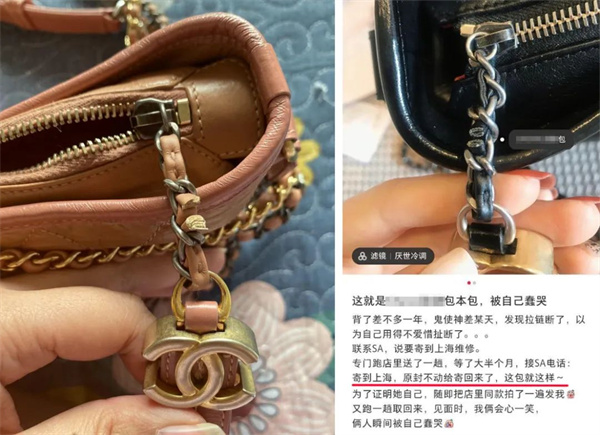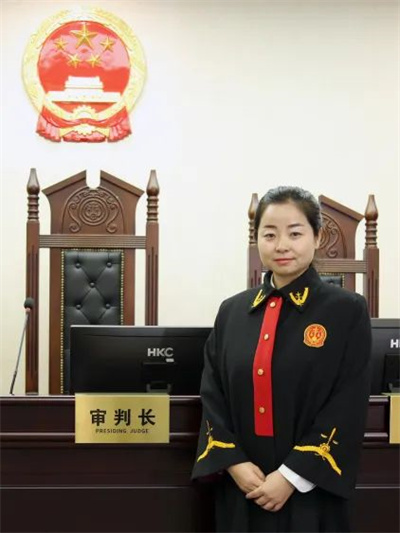Can compensation be claimed if condition of a second-hand luxury item purchased in a livestream sale is found to be inconsistent with the advertised quality four months later?
The Beijing Internet Court (BIC) concluded an information network sales contract case where the plaintiff surnamed Yuan sued the defendant, a technology and culture company, alleging it had committed fraud by selling a product with inferior quality. The court ruled that the comparison between the quality of the product four months after the plaintiff bought it and the quality introduced by the defendant during the livestream sale was not sufficient to prove the defendant committed fraud on the quality of the product. The BIC dismissed the plaintiff's claim of three times the amount paid and the verdict is now in effect.
Case summary

The image of the bag involved in the case (L) and the image of the same model of the bag posted by another netizen (R). [Photo/Beijing Internet Court]
The plaintiff surnamed Yuan bought a secondhand luxury brand shoulder bag during a livestream sales session for 21,702 yuan ($3,138.5). Four months after he received the bag and had started to use it, he found that the bag's shoulder strap broke. He then checked the assessment report provided by the defendant and found out that the shoulder strap was already broken when it was sent for assessment.
The defendant argued that the involved bag was designed to have a chain leather strap joint, so it was rather a design flaw than a state of disrepair. The plaintiff acknowledged the argument, but claimed that the strap joint was severely worn out, which did not meet the defendant's claim of a 95 percent new condition.
According to the plaintiff, the defendant specifically stated during the livestream session that the bag involved was 95 percent new because it was only missing the packaging box, dust bag and the product ID card. It did not truthfully disclose the defects of the product, which was intentional concealment of truth and false advertising. Thus, the plaintiff claimed that the defendant committed fraud and was liable for the triple payment compensation.
Focus of the dispute:
Did the defendant's failure to truthfully disclose the defects and quality issues of the product constitute fraud? Did the defendant need to supply a refund of triple compensation?
After trial, the BIC concluded that:
The law mandates four necessary elements to constitute fraud: the intention of fraud, the implementation of fraudulent behavior, the other party is thus caught in a misconception due to the fraud, and the other party expressing an intention that is contrary to the true intention due to the misconception. In this case, the plaintiff acknowledged that he was aware of the shoulder strap chain leather joint being a design feature of the bag. Therefore, the defendant’s failure to introduce this feature during the livestream session did not constitute concealment or fabrication of relevant facts.
Regarding the wear condition of the joint, based on the images of the current condition of the product provided by the plaintiff, there were indeed traces of wearing. The defendant also acknowledged that, according to the disclosed assessment standard, the product should be rated between 90 to 95 percent new. However, the images provided by the plaintiff were taken four months after receipt, and the plaintiff fail to provide evidence of the actual condition of the product at the time of receipt. Therefore, the existing evidence can not directly prove that the defendant intentionally exaggerated the quality level of the product during the livestream session, and thus fraud could not be determined.
Eventually, given that the defendant agreed to terminate the contract, take back the product involved and return the payment, the BIC supported the plaintiff’s claim for termination of the contract and return of the product for refund.
Details of the judgement:
The BIC ordered the plaintiff to return the product involved to the defendant, and the defendant to refund the payment within three days of receiving the product. The court dismissed the plaintiff’s other claims.
Tips from the judge:

Judge Feng Yu from the Beijing Internet Court. [Photo/Beijing Internet Court]
Consumers rely heavily on the detailed display of the appearance of the product and a comprehensive introduction of the product by the livestream sales host in terms of livestream sales of secondhand luxury goods. This case clarifies that in such scenarios, in addition to ensuring the authenticity of the goods, business operators must also have a basis for determining the condition of the product, and give specific explanations and key demonstrations of the critical details that may affect the grading standards. If consumers claim that the actual condition of the goods received is not as advertised in the livestream sales session, they must gather evidence in a timely manner. Otherwise, it is not possible to conclude that the seller deliberately concealed the quality issues with fraudulent intent.
For consumers who purchase secondhand luxury goods in livestream sales, after placing an order in the live streaming room, they should promptly go to the store's product detail page to compare and verify the live streaming content. If any doubts arise, they should immediately inquire with customer service for confirmation. Upon receiving the goods, they should immediately verify the key facts of the goods such as authenticity and condition, and gather legal and other effective evidence to safeguard their own legitimate rights and interests.

 Beijing Internet Court Lawsuit Service WeChat Account
Beijing Internet Court Lawsuit Service WeChat Account  Beijing Internet Court WeChat Account
Beijing Internet Court WeChat Account